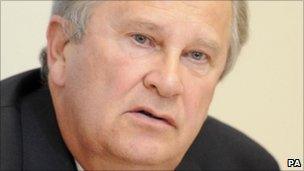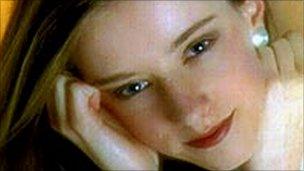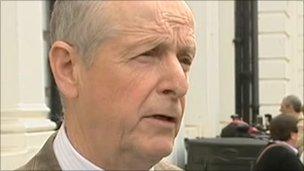7/7 inquests: Families welcome report as grief persists
- Published

Grahame Russell feels it is time to let go otherwise his life will become bitter
Families of the 52 people killed in the July 2005 London bombings have welcomed a coroner's recommendations, but several vowed to seek a public inquiry.
At the end of the inquests, relatives differed over whether to draw a line under events or begin a new chapter and seek more answers.
Most urged MI5 and emergency services to heed the recommendations.
Grahame Russell said that he backed the report but it would not bring his son, Philip, back.
Mr Russell, who lost Philip days before his 29th birthday, said each one of the families in court had their own concerns, whether about the security services, emergency services or the government, but he needed to let go of his to avoid becoming bitter.
John Taylor, father of 24-year-old Carrie who was killed in the Aldgate blast, said: "The inquest for us was not about pointing fingers at people. Things went wrong and we accept that."
However, he said, he worried about the future.
"The warning shots were there after 9/11. We stepped up our security, but I feel after a year, a year-and-a-half, two years, we got complacent. I fear that could happen again," he said.
Cries for help

Carrie Taylor died on a Circle Line Tube train near Aldgate station
In a joint press conference in central London, Mr Taylor criticised MI5, saying the security service appeared as though it had expected not to be called on to give evidence.
Mr Russell said the chaos in Transport for London's control room had caused him concern, while Graham Foulkes, father of 22-year-old David killed at Edgware Road, said MI5's poor record-keeping had been "a recipe for disaster".
There were also calls for a public inquiry. Marie Fatayi-Williams, whose 26-year-old son Anthony died on the number 30 bus in Tavistock Square, said: "For me, these are the issues that still need to be known - what did MI5 know before and how has it come to light or not come to light?"
Speaking outside court, Sean Cassidy, whose son Ciaran, 22, died in the Russell Square blast, said he accepted Lady Justice Hallett's finding that none of the victims could have been saved.
However, that did not excuse emergency services arriving an hour late, he said.
"We're talking about the injured here as well, people crying out on Tubes for assistance," he added.

Sean Cassidy criticised the emergency services' late arrival at the scene
Before the coroner's verdict, relatives had drawn up a list of recommendations.
Among them was a call for ambulance staff to prioritise patients whose airways may be closing and require basic life-saving dressings, ahead of attaching triage cards to the dead and injured. This formed part of one of the coroner's nine recommendations.
"Some of the emergency services, if they call themselves the best in the world... I don't know who the second best are; I wouldn't like to deal with them," said Mr Cassidy.
"All the medical staff, all they're doing is triaging. I mean, how many people do we need to triage? It needs to be something better done about the triaging system."
Not all the victims had family in court to hear the coroner's final remarks.
John Falding was on the phone to his girlfriend, Anat Rosenberg, when a bomb blew the top off the bus she was travelling on.
He did not attend any part of the inquests and had tried to avoid the news coverage, but during the course of the inquests he changed his mind over the need for a public inquiry.
The remit, had in effect, made it a public inquiry, he said, and any further inquiry would be a waste of time and money.
He said he now wanted to draw a line under events on that day. "I will now put that operational side of it behind me and will carry on grieving as normal," he said.
Held hands
Witness Tim Coulson, who was in court, gave evidence in November of how he smashed his way out of a carriage at Edgware Road to try to save father-of-two Michael Brewster.
He said he felt justice had been "seen to be done, properly and effectively" and praised the coroner for taking all of the evidence, all of the gore and still pursuing what others would have given up on.
Earlier, he met Mr Brewster's wife, Sandra, for the first time and said the emotions had been intense.
"Her expression was that I was the man who last held the hand of her husband so I found that particularly traumatic," he said.